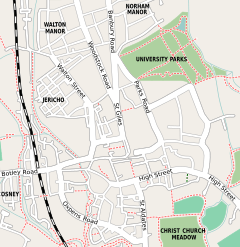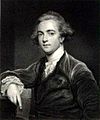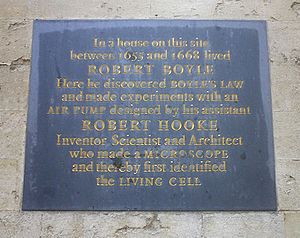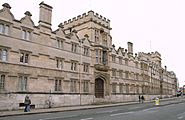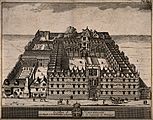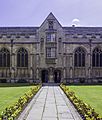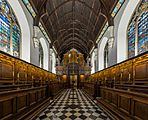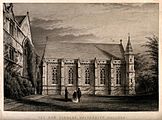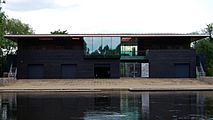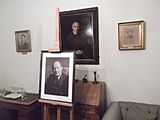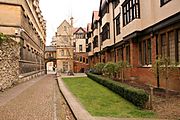University College, Oxford facts for kids
Quick facts for kids University College |
||||||
|---|---|---|---|---|---|---|
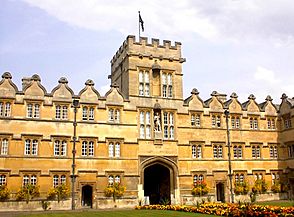 |
||||||
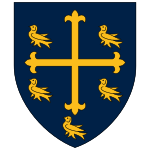
Blazon: Azure, a cross patonce between four [sometimes five] martlets or.
|
||||||
|
|
||||||
| University | Oxford | |||||
| Location | High Street, Oxford OX1 4BH | |||||
| Coordinates | 51°45′09″N 1°15′07″W / 51.7525°N 1.2520°W | |||||
| Full name | The College of the Great Hall of the University of Oxford | |||||
| Latin name | Collegium Magnae Aulae Universitatis Oxon. | |||||
| Established | 1249 | |||||
| Sister college | Trinity Hall, Cambridge | |||||
| Master | Valerie Amos, Baroness Amos | |||||
| Undergraduates | 425 (2023–24) | |||||
| Postgraduates | 219 (2023–24) | |||||
| Boat club | University College Boat Club | |||||
| Map | ||||||
University College, often called Univ, is one of the oldest colleges at the University of Oxford in England. It was officially founded in 1249 by William of Durham. People sometimes call it "Univ" for short.
As of 2023, the college had a lot of money saved up, about £146 million. Their total assets, including buildings, were around £238 million.
Many famous people have studied at Univ. These include former UK Prime Ministers Clement Attlee and Harold Wilson. Even US President Bill Clinton and his daughter Chelsea Clinton spent time there. Other notable alumni include scientist Stephen Hawking and author C. S. Lewis.
Contents
Discover Univ's Long History
Univ has a very old history, with some interesting stories about its beginnings.
How Univ Started: The Real Story
A story from the 1300s said that King Alfred founded the college in 872. This is why the college uses symbols linked to King Alfred. It's also why the current King or Queen is always the college's official "Visitor." The college even celebrated its 1000th birthday in 1872 because of this legend!
However, most people now agree that the college truly began in 1249. This was when William of Durham left money to help students. He wanted to support ten or twelve masters studying religious topics. A property called Aula Universitatis (University Hall) was bought in 1253.
This founding date still makes Univ one of Oxford's oldest colleges. But other colleges like Balliol College and Merton College also claim to be the oldest. For a long time, until the 1500s, Univ only accepted students studying theology (religion).
Growing and Changing Over Time
Univ bought more land on its current site in 1332 and 1336. They built a main square, called a quadrangle, in the 1400s. As the college got bigger and richer, they replaced these old buildings. The current Main Quadrangle was built in the 1600s.
Work on the Main Quadrangle started in 1634. But the English Civil War caused delays. It wasn't finished until 1676. The Radcliffe Quad was built faster, by 1719. The college library was added in 1861.
Like many Oxford colleges, University College used to be only for men. But in 1979, it started accepting both male and female students.
Explore Univ's Buildings
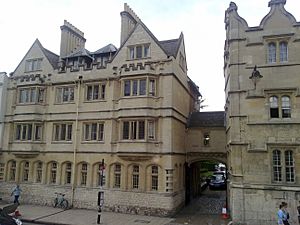
The main entrance to University College is on High Street. The college grounds are also next to Merton Street and Magpie Lane. A special lane called Logic Lane runs right through the middle of the college. Univ actually owns this lane!
On the western side of the college, you'll find the library, the main dining hall, and the chapel. There are also two quadrangles here. These areas have student rooms and college offices. The eastern side of the college is mostly for student housing. These rooms are above shops on High Street, on Merton Street, or in the Goodhart Building. This building is named after Arthur Lehman Goodhart, a former head of the college.
There's a special building at Univ called the Shelley Memorial. It holds a statue of the poet Percy Bysshe Shelley. He was a student at Univ but was asked to leave because he wrote a controversial essay. The statue shows Shelley lying as if he has just died on an Italian beach.
Univ also has an annexe building on Staverton Road in North Oxford. This is where second-year undergraduate students and some graduate students live. The college also owns the University College Boathouse, which was finished in 2007. There's also a sports ground nearby on Abingdon Road.
Student Life at Univ
Life at University College is full of unique traditions and helpful resources for students.
Univ's Alternative Prospectus
The Alternative Prospectus is a special guide written by current students for future students. It gives honest advice and tips for applying to Oxford. In 2011, this publication won an award for being innovative. The award recognized how well students and staff worked together on it. It also praised its newspaper style and use of social media.
The College Grace
University College has the longest "grace" (a short prayer) of any college at Oxford. This grace is read before every formal dinner, called "Formal Hall." These dinners happen on Tuesdays, Thursdays, and Sundays. A student who has a scholarship reads part of it. The person sitting at the main table, usually the Master of the college, reads the rest.
Original Latin Version
SCHOLAR – Benedictus sit Deus in donis suis.
RESPONSE – Et sanctus in omnibus operibus suis.
SCHOLAR – Adiutorium nostrum in Nomine Domini.
RESPONSE – Qui fecit coelum et terram.
SCHOLAR – Sit Nomen Domini benedictum.
RESPONSE – Ab hoc tempore usque in saecula.
SCHOLAR – Domine Deus, Resurrectio et Vita credentium, Qui semper es laudandus tam in viventibus quam in defunctis, gratias Tibi agimus pro omnibus Fundatoribus caeterisque Benefactoribus nostris, quorum beneficiis hic ad pietatem et ad studia literarum alimur: Te rogantes ut nos, hisce Tuis donis ad Tuam gloriam recte utentes, una cum iis ad vitam immortalem perducamur. Per Jesum Christum Dominum nostrum.
RESPONSE - Amen.
SCHOLAR — Deus det vivis gratiam, defunctis requiem: Ecclesiae, Regi, Regnoque nostro, pacem et concordiam: et nobis peccatoribus vitam aeternam.
RESPONSE - Amen.
English Translation
SCHOLAR — Let God be blessed in his gifts.
RESPONSE — And holy in all his works.
SCHOLAR — Our help is in the Name of the Lord.
RESPONSE — Who has made heaven and earth.
SCHOLAR — May the Name of the Lord be blessed.
RESPONSE — From this time for evermore.
SCHOLAR — Lord God, the resurrection and the life of them that believe, who are always to be praised both among the living and among the dead, we give You thanks for all our founders and other benefactors, by whose gifts we are nourished here for piety and the study of letters; asking You that we, using these Your gifts rightly to Your glory, may be led together with them into eternal life. Through Jesus Christ our Lord.
RESPONSE — Amen.
SCHOLAR — May God grant to the living grace, and to the dead rest; to the Church, the King, and our realm, peace and concord; and to us sinners everlasting life.
RESPONSE — Amen.
Famous People from Univ
- Further information: and List of Honorary Fellows of University College, Oxford
Many important people in different fields have studied at University College.
Leaders in Government and Politics
-
William Beveridge, an important economist
-
Harold Wilson, another former Prime Minister of the United Kingdom
-
Felix Yusupov, a Russian noble
-
John Scott, 1st Earl of Eldon, a former top judge
-
The Viscount Cecil of Chelwood, a politician and Nobel Peace Prize winner
-
Bill Clinton, a former President of the United States of America (he didn't finish his degree here)
-
Robert Reich, an economic advisor and author
-
William Weld, a former Governor of Massachusetts
-
Bob Hawke, a former Prime Minister of Australia
-
Philip Hammond, a former top UK finance minister
-
Neil Gorsuch, a judge on the Supreme Court of the United States
-
Festus Mogae, the 3rd President of Botswana
-
Chelsea Clinton, who works with the Clinton Foundation
Univ has educated many influential politicians. These include William Beveridge, who wrote a famous report about social welfare. Two UK Prime Ministers, Clement Attlee and Harold Wilson, also studied here. Bill Clinton, a former US President, attended Univ, as did Bob Hawke, a former Prime Minister of Australia.
Other world leaders from Univ include Edgar Whitehead (Rhodesia), Kofi Abrefa Busia (Ghana), and Festus Mogae (Botswana). Robert Cecil, who won the Nobel Peace Prize, studied law at Univ. Neil Gorsuch, a judge on the U.S. Supreme Court, earned a law degree here. Bernard W. Rogers, a former top commander for NATO, studied Philosophy, Politics, and Economics.
Writers and Artists
-
Percy Bysshe Shelley, a famous Romantic poet
-
George Abbot, a former archbishop of Canterbury
-
C. S. Lewis, who wrote The Chronicles of Narnia
-
Andrew Motion, a former official poet for the UK
-
Max Hastings, a historian and journalist
In the world of arts and literature, Univ has a strong connection to many famous people. Poet Percy Bysshe Shelley was a student here. He was expelled for writing about atheism, but there is now a memorial to him at the college. Andrew Motion, a former Poet Laureate (the UK's official poet), also studied at Univ.
C. S. Lewis, the author of the beloved Narnia books, was a student. Sir V. S. Naipaul, who won the Nobel Prize for Literature, also attended Univ. George Abbot, who helped translate the King James Bible, was once the Master of the college. Actors Michael York and Warren Mitchell, along with broadcaster Paul Gambaccini, are also Univ alumni.
Scientists and Inventors
-
Stephen Hawking, a brilliant theoretical physicist
-
William Jones, a language expert
-
John Radcliffe, a famous physician
-
Rudolph A. Marcus, a Nobel Prize-winning chemist
It's interesting to know that Stephen Hawking, the famous theoretical physicist, studied natural sciences at Univ. He focused on physics because the college didn't have a mathematics tutor at the time. Other notable former students include John Radcliffe, a physician, and William Jones, a language expert. Edmund Cartwright, an inventor, also studied here.
Rudolph A. Marcus, a chemist who won the 1992 Nobel Prize in Chemistry, was a visiting professor at Univ from 1975 to 1976. A more unusual former student was Prince Felix Yusupov, who was involved in the assassination of Rasputin.
In 2007, Univ had the highest number of former students donating money back to the college compared to other Oxford and Cambridge colleges. About 28% of its old members gave financial support.
Other Interesting Connections
Even though they weren't students at University College, the scientists Robert Boyle and his assistant Robert Hooke lived nearby. Boyle is sometimes called the "first modern chemist." Hooke was an architect and biologist who discovered cells. They lived in Deep Hall, which is now where the Shelley Memorial stands. Robert Boyle even helped finish the college's main dining hall in the mid-1600s.
Samuel Johnson, who wrote a famous English dictionary, often visited Univ in the 1700s. He was a student at Pembroke College, but he enjoyed spending time in Univ's Senior Common Room.
Gallery
-
University College, on the south side of the High Street.
-
The interior of the chapel of University College, Oxford.
-
Courtyard of University College Oxford.
-
Dr Bowen's Room, University College, Oxford.
See also
- University College Oxford Boat Club
- University College Players (college dramatic society)


